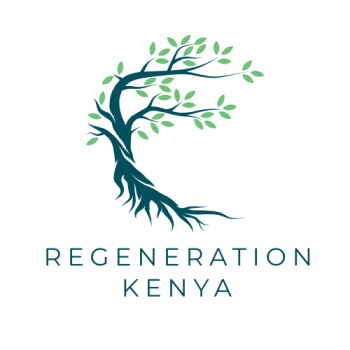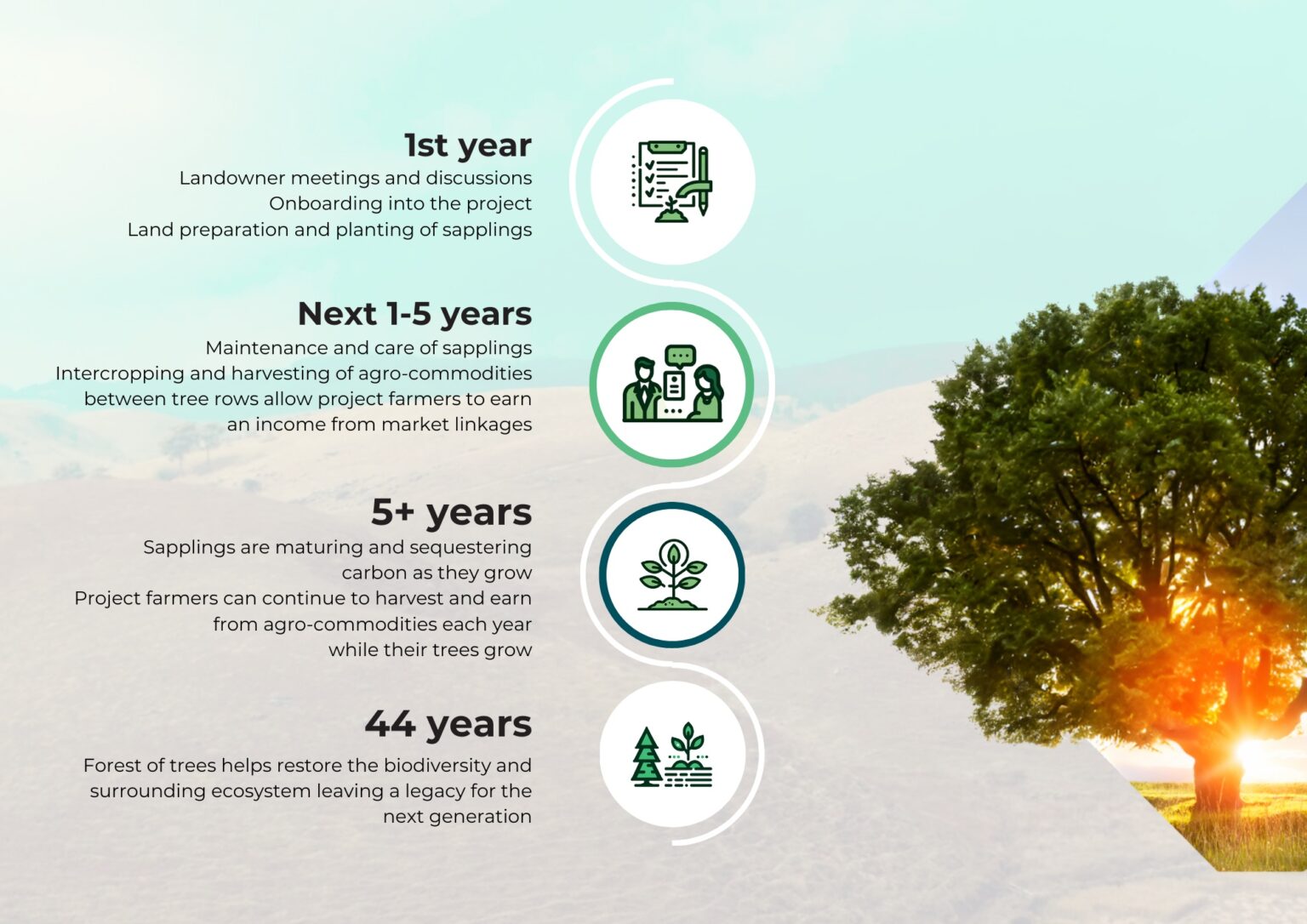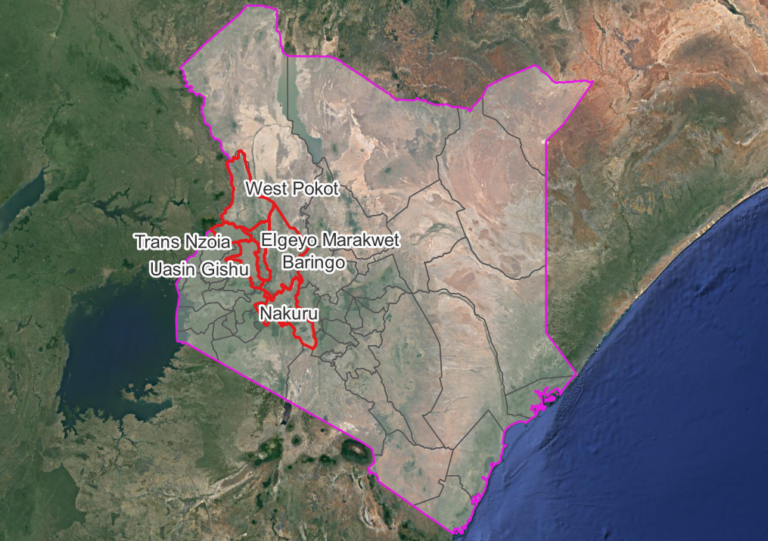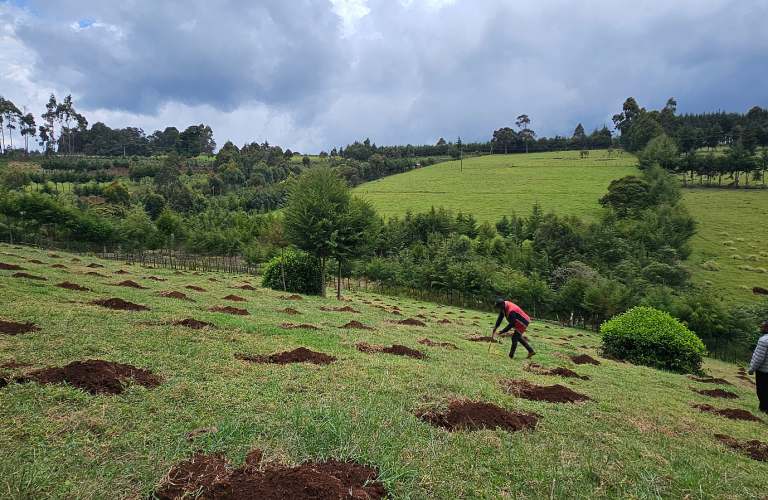
SUMMARY OF PROJECT DETAILS
Project Title | Regeneration Kenya |
Sector | Climate Change Adaptation and Mitigation |
Project type/methods | Afforestation, Reforestation and Revegetation (ARR) |
Project activities | Agroforestry Farmer Managed Natural Regeneration (FMNR) |
Tree species types | Native/Indigenous Exotic/naturalised |
Participants | ~4,500 households |
Timeframe | 2024–2027 Implementation |
Crediting period | 2024–2068 |
OVERVIEW
This agroforestry and sustainable livelihoods project is located in the Rift Valley region, covering counties including Elgeyo Marakwet, Uasin Gishu, Baringo, West Pokot and Trans Nzoia. In the first project instance, we plan to restore approximately 3,500 hectares and eventually, we will scale to restore up to 26,000 hectares of land in the Rift Valley region of Kenya.
PROJECT OUTCOMES
- Approximately 4,500 farmers supported to grow and maintain up to 40 million trees to benefit from ongoing payments for carbon sequestration and sales of agro commodities.
- Up to 26,000 ha of degraded land restored.
- Improved livelihoods and resilience to impacts of climate change.
- Sequester Millions of tonnes of carbon
- Up to 1,000 jobs to be created through Earthtree and the wider community.
- Increased annual incomes.
SUSTAINABLE DEVELOPMENT GOALS
- SDG 1 No Poverty – Improved livelihoods and incomes
- SDG 2 – Zero Hunger – Increase productivity
- SDG 3 – Good Health and Well-Being – Reduce indoor pollution
- SDG 5 – Gender Equality – enhance participation of women and marginalised groups
- SDG 7 – Affordable and Clean Energy – Improve access to renewable energy
- SDG 8 – Decent Work and Economic Growth – employ over 1000 youth and women
- SDG 13 – Climate Change – Storage of millions of tonnes of CO2
- SDG 15 – Life On Land – Restore up to 26,000 ha degraded land

NOT JUST TREES
The Regeneration Project is not only planting trees. Across the six (6) counties, the Regeneration Kenya technical support teams will work with private landowners to adopt agroforestry and sustainable livelihoods to improve soil and water management and create jobs for improved livelihoods. Some positive impacts of the project include increased food security, facilitation of a switch to cleaner fuels and efficient cook stoves, increased market linkages, climate resilience and job creation. The project is being implemented by Earthbanc in partnership with Earthtree Kenya.
Activities focus on:
- Private landowners/farmers, community mobilisation and engagement – contracting farmers to grow and maintain trees for at least 44 years.
- Capacity building on appropriate agroforestry, farmer-managed natural regeneration, low-cost on-farm soil and water conservation practices.
- Increased participation in agro-commodities, climate resilient and green value chains that support land regeneration activities.
- Facilitation of community dialogues and sensitization activities to address climate change-related risks, and human-ecosystem conflicts and stimulate adoption of regenerative practices.
- Community advocacy for relevant policies and by-laws that support sustainable land management.
- Climate stakeholders use evidence and learnings for planning.
TARGET LOCATIONS AND GROUPS
The Regeneration Kenya (RK) Project, works closely with The Ministry of Environment, Climate Change and Forestry, County government leaderships and civil societies as stakeholders in the six counties of Rift Valley Kenya. In 2024, the project aims to cover Elgeyo Marakwet, Uasin Gishu, and Baringo to work with 95 farmers of 500 ha to plant up to 632,424 trees and 100 ha ANR. In 2025, the project will work with 712 farmers to plant up to 5.8 million trees and restore 3,058 Ha and regenerate 100 ha through ANR.
Beyond 2025, the project aims to scale to restore up to 26,000 ha in the remaining counties. The feasibility, biophysical and socioeconomic assessments have confirmed the areas as being suitable for potential for regeneration projects.
The project does not lease or buy land from participating farmers and landowners who wish to plant trees on their land. A long-term Landowner (farmer) Agreement provides certainty regarding the arrangement between the landowner and Earthtree. The ownership of any agro-commodity food product produced on the land will be shared between the landowner and Earthtree.

IMPLEMENTATION MODELS
- Woodlots: The planting or regeneration of either single or mixed native, exotic or naturalised tree species. Annual crops and shade-tolerant species can be grown between or under the canopy of the trees until canopy closure.
- Silvopastoral restoration to forest or woodland: Farmer-managed natural regeneration and active management of bushlands, tree stumps and/or seeds that have self-germinated from the soil, allowing them to grow into productive or useful trees so as to restore vegetation to a productive state for grazing.
- Agroforestry – annual crops: The dispersed interplanting or regeneration of various mixed native tree and naturalised tree species, interspersed with annual crops e.g., beans, sorghum and maize.
- Agroforestry – perennial crops: The planting or regeneration of various mixed native trees and naturalised tree species, interspersed with perennial crops e.g., coffee, cacao, and bananas.
- Boundary or strip planting: Boundary or strip planting with mixed native or naturalised species. Regeneration consists of single rows along the farm boundaries or on the borders of cultivated land. A farmer may also choose to plant or regenerate strips of trees within the cultivated land.
PROJECT BENEFITS SHARING:
The project has multiple benefits. The benefits include carbon and agro-commodities profit sharing, livelihoods, market linkages, income generations, capacity building, soil erosion control among other multiple ecosystem services.
Trees absorb carbon dioxide (CO₂) from the atmosphere and grow, forming wood. The carbon dioxide absorbed remains stored as carbon in the tree for as long as it is not cut. The tree growing, absorption and storage of carbon are monitored, measured and reported every year.
Carbon dioxide absorbed is measured in tonnes (tCO2e). One tonne (1 tCO2e) is equivalent to one credit. An independent verification team will verify at regular intervals, (with every 5 years being the most likely) the carbon credits generated and issued by Gold Standard. The land owners will receive carbon payment benefits after the sale of independently verified, certified and issued carbon credits.
This acts as an incentive for farmers to protect and maintain trees permanently. It is important for landowners to understand that trees provide multiple environmental services. Landowners will receive payments from the net profits earned from carbon and agro commodities sales.
Earthbanc is the supporting project development, monitoring, reporting and MRV software provision.

Earthtree leads field implementation activities, species selection, nursery management, planting, agroforestry, ANR, agro-commodities, marketing, fabrications etc.
Other partners/stakeholders
Stakeholders in such projects include farmers, landowners, community, coops, Kenya Forestry Research Institute (KEFRI), KFS, KWTA, WRUAs, County Governments, Other partners/stakeholders include Kenya Forestry Research Institute (KEFRI), KFS, KWTA, WRUAs, County Governments, NGOs, CBOs/FBOs, private sector etc.
Do you have any feedback, suggestions or concerns?

Contact us through:
Participate in community meetings organised by our project team to share with us your views as we plan together.
Call/WhatsApp/SMS on: 0746621837 OR 0782470897
(Available Monday to Thursday, 8 am – 5 pm, and 8 am – 2 pm on Fridays, Closed on Public holidays and weekends)
Email us at [email protected]
Feedback form: https://earthtree.ke/landowner-feedback-form/
Visit our office at Earthtree Company Limited, P.O Box 5248-30100 Kenmosa Village, Eldoret

